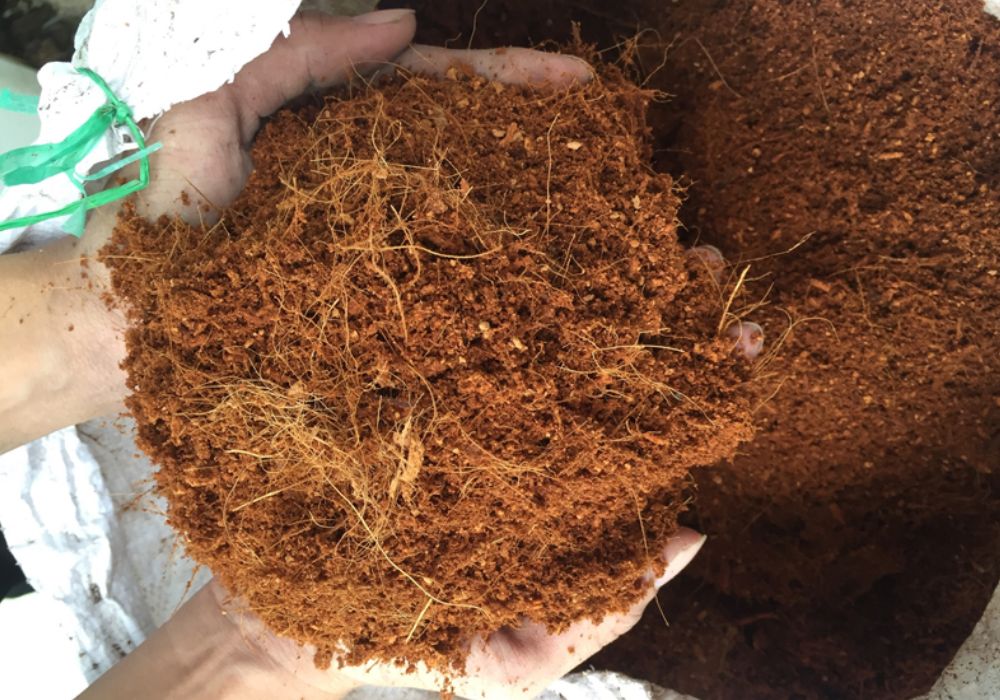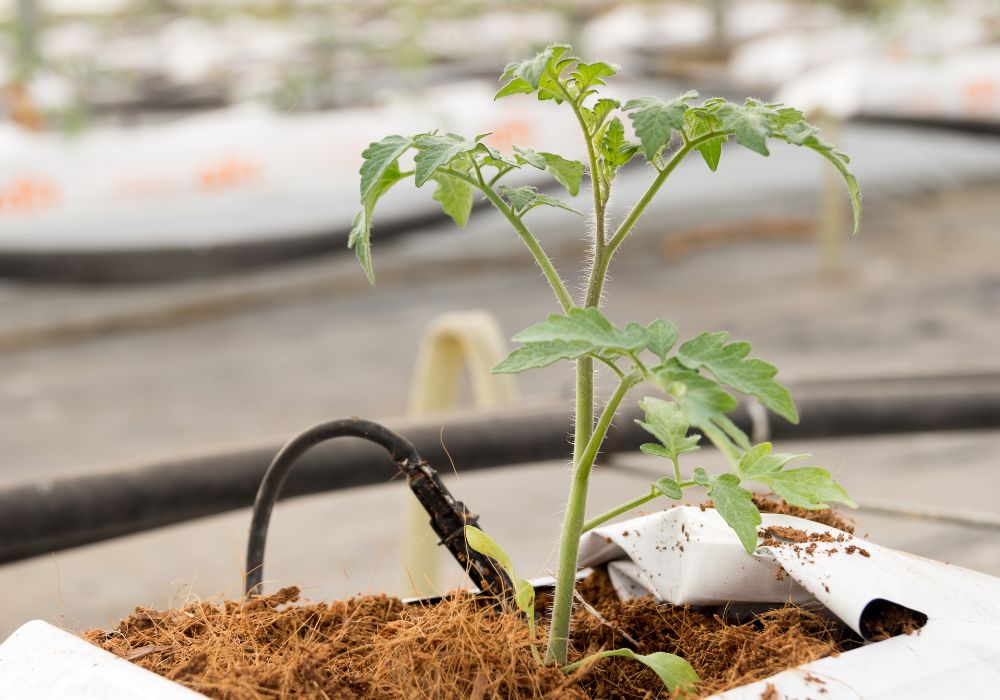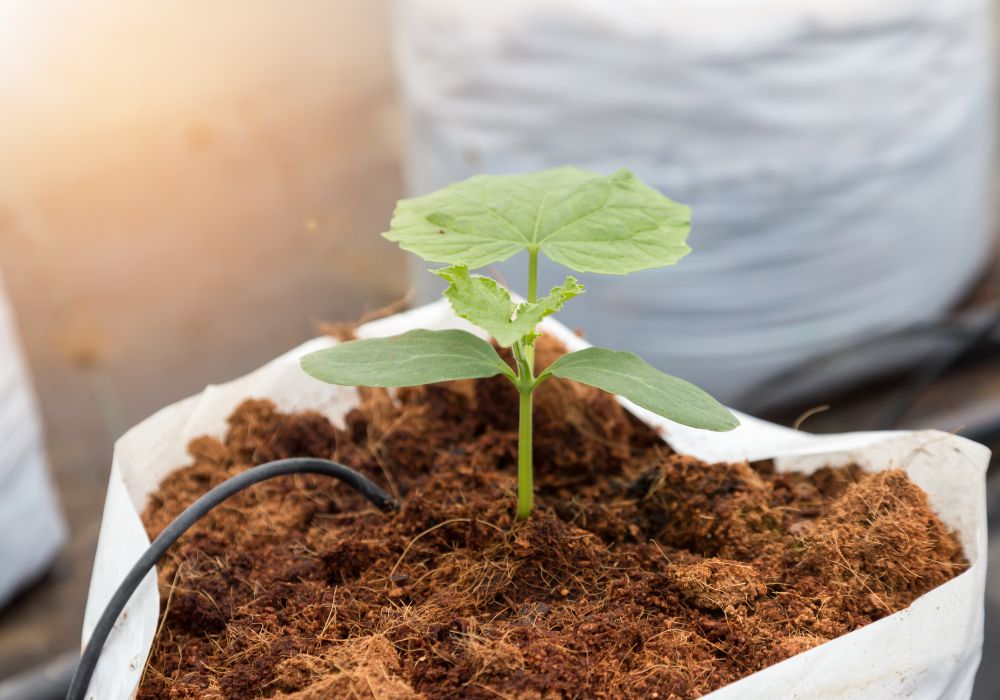Gardeners always look for ways to improve our plants’ growth and health. One area of interest is finding the proper mulch to use in your gardens. In recent years, coconut coir mulch (also known as coconut husk mulch, coconut shell mulch, coco chips mulch, etc) has become popular among gardeners due to its many benefits.
Contents
What is Coconut Coir Mulch?
Coconut coir mulch is a natural and sustainable mulch made from the fibrous material found between the hard internal shell and the outer coat of a coconut. This fibrous material is also known as coconut coir or coco coir.
It is a popular alternative to traditional mulches such as wood chips or straws. Its advantages include being lightweight, easy to handle, and having a high water retention capacity. Coconut coir mulch is also resistant to fungal growth, making it a good choice for areas where dampness is a concern.
Garderners often use coco mulch in landscaping and gardening to retain soil moisture and suppress weed growth. It is also a popular choice for hydroponic growing systems, providing an excellent growing medium for plants. Additionally, coconut fibre mulch is environmentally friendly, as it is a renewable and biodegradable resource.
Benefits of Using Coconut Coir Mulch
-
- <li
>Water ret
-
- =”list-style-type: none;”>
- ention –
Coconut coir mulch
- has excellent water retention properties. It can
- =”list-style-type: none;”>
hold up to 10 time
- s its weight in water, which reduces the need for frequent watering and helps prevent soil erosion.
- Moisture regulation – Because of its water-holding capacity, coconut husk mulch regulates moisture levels in the soil. It releases water slowly, reducing the chances of over-watering or under-watering your plants.</li>
- pH neutral – Unlike other organic mulches, such as pine bark or straw, coconut coir mulch is pH neutral. It won’t affect the pH balance of your soil, making it suitable for a wide range of plants.
- Weed suppression – Coconut shell mulch forms a dense layer that helps suppress weed growth. This reduces the amount of time and effort needed to maintain your garden.
- Pest resistance – Coconut fibre mulch is less attractive to pests than other organic mulches. It also contains lignin, which repels insects and fungi that can damage plants.
- Improved soil structure – Over time, coconut coir mulch breaks down and becomes incorporated into the soil. This improves soil structure, providing better aeration and drainage for your plants.
- Sustainable – Coconut coir mulch is an eco-friendly option because it’s made from a renewable resource that would otherwise go to waste.
How to Use Coconut Coir Mulch?</strong>
- Prepare the soil – Before applying coconut coir mulch, ensure the soil is moist and weeds-free.
- Apply the mulch – Spread the coco coir mulch evenly over the soil surface, providing a depth of at least 2-3 inches.
- Maintain the mulch – Check it periodically to ensure it’s not compacted or drying out. If necessary, add more mulch to maintain the desired depth.
Additional tips:
- To make the most of the water retention properties of coco coir mulch, consider watering the soil before applying the mulch.
- Mix coco coir mulch in a container garden with potting soil for improved drainage and moisture retention.
- To avoid attracting pests, avoid over-applying coconut coir mulch or letting it touch the stems of plants.
- When using coconut coir mulch in hydroponic growing systems, rinse it thoroughly to remove excess salts and other impurities.
=”text-align: justify;”>Conclusion
Coconut coir mulch is an excellent option for gardeners to improve their soil’s health and plant growth. Its water retention, moisture regulation, pH neutrality, weed suppression, pest resistance, improved soil structure, and sustainability make it an ideal choice for any garden or landscaping project.
<h2 style=”text-align: justify;”>FAQs</strong>
stify;”>Q: Is coconut coir a good mulch? A: Yes, coconut coir is an excellent mulch choice for many reasons. As a mulch, coconut shell coir helps to retain moisture in the soil and suppress weed growth. It also has a neutral pH, so it won’t acidify the soil like other mulches, such as pine bark or sawdust.
Q: Does coco coir attract bugs? A: Coconut coir, like any organic material, can attract insects and other pests if it is not stored or used properly. However, in general, coconut coir is not known to attract bugs or pests.
Q: Is coconut coir mulch suitable for all types of plants? A: Coco coir mulch is pH-neutral and suitable for many plants.
Q: How often should I replace coco coir mulch? A: Coco coir mulch breaks down slowly, so it’s long-lasting. It can last up to three years before needing replacement.
Q: Can I use coco coir mulch in hydroponic gardening? A: Coconut coir chips are an excellent option for hydroponic gardening.
Q: Is coconut coir mulch expensive? A: Coco coir mulch is reasonably priced and comparable to other organic mulches.
Q: Where can I purchase coconut coir mulch? A: It is available at most garden centers, nurseries, and online retailers.
Check out our handicraft Products, Coconut Bowls Category and don’t hesitate to send us an email at [email protected] or leave us a message at WhatsApp: +84967485411 if you have any questions.




 >
>